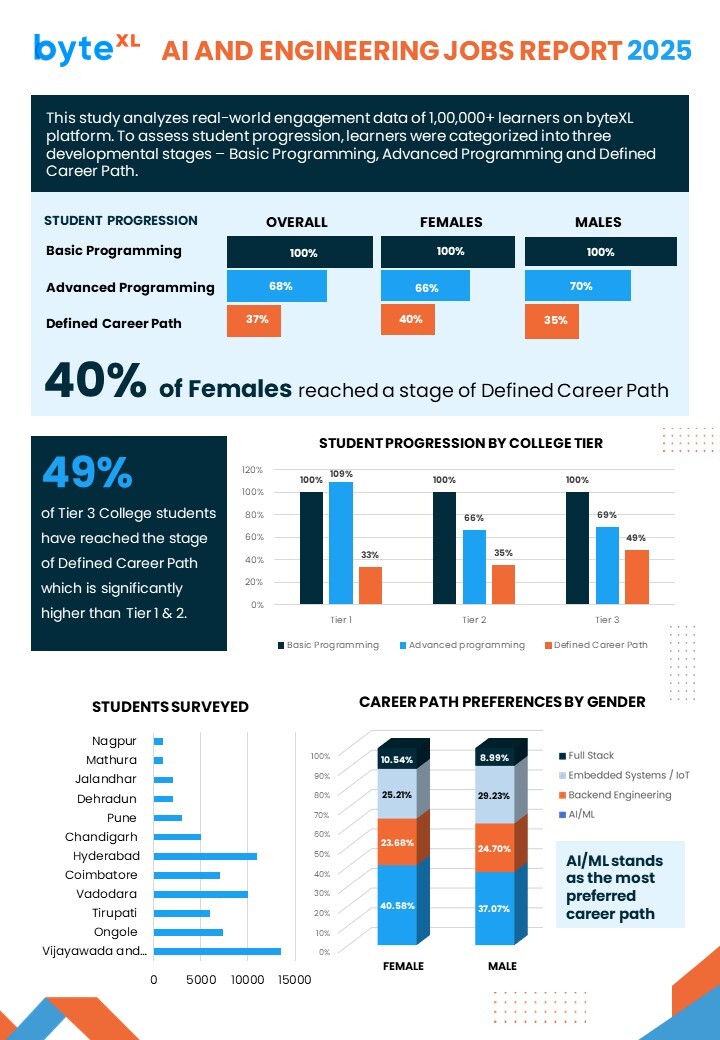Women engineering students in India are demonstrating a strong and early commitment to careers in emerging technologies like artificial intelligence (AI) and machine learning (ML), according to the byteXL AI and Engineering Jobs Report 2025.
The report is based on behavioural insights from over 100,000 students – 62,000 male and 38,000 female – using byteXL’s learning platforms. It draws from live platform data, including code practice and project workspace usage, offering a detailed view into how India’s next generation of engineers is learning. It tracks how students progress from basic programming to project-based learning and, finally, to choosing a specific career track. According to the data, 40 percent of female students reached the final stage of career track selection, compared to only 35 percent of male students. Among those who did, women showed a notably strong preference for AI and machine learning.
“Artificial intelligence and machine learning are transforming various industrial sectors through decision-making, large scale personalization, and process automation. This never-ending process of innovation and transformation is what sparked my curiosity and led me to pursue AI/ML as a career path,” said a female student from Parul University, Vadodara.
The report also highlights surprising leadership from students in smaller towns and Tier 3 colleges. Nearly half (49 percent) of students identified a clear career path, outperforming peers from Tier 1 and Tier 2 colleges, who stood at 33 percent and 35 percent respectively. Tier 1 students, while more likely to dive directly into project-based learning due to prior exposure, showed comparatively less alignment with long-term goals.
Another significant trend is the rising preference for AI/ML careers among students from Tier 2 and Tier 3 cities. While only 16 percent of Tier 1 students selected AI/ML as their preferred track, interest soared to 37.9 percent among Tier 2 students and a striking 53.9 percent among those from Tier 3 colleges. Notable Tier 1 cities surveyed included Hyderabad and Pune, while Tier 2 cities featured Vijayawada, Nagpur, Chandigarh, and Dehradun.
“AI is rapidly transforming every industry, creating smarter solutions and opening new possibilities every day. As a passionate learner, I’m choosing AI/ML as my career path to be part of this innovation and solve real-world problems that matter,” said another female student from Malineni Lakshmaiah Women’s Engineering College, Guntur.
“There is a lot of hunger among students from smaller towns. Engineering continues to be a pathway to a better life. The fact that young women are excelling shows their determination and resolve to make a mark,” said Karun Tadepalli, CEO and Co-founder, of byteXL. “The report also shows how today’s engineering students are more intentional about their choices. Back in the 90s, switching tracks was rare – a programmer was expected to remain one for life. Today, with agentic AI playing a disruptive role in all aspects of life, students are being strategic about diversifying their skills and keeping their options open. They are making more thoughtful, future-ready choices,” he added.
The report highlights a generation of students that is not only learning faster but also thinking deeper about their futures. Their choices, especially in fast-evolving fields like AI/ML, signal a strong pipeline of innovation and talent emerging from across India, with women and students from smaller towns leading the charge.
About byteXL:
byteXL is an edtech company transforming engineering colleges in India by revolutionizing the education system and creating a pathway of opportunity for students. They are achieving this by partnering with colleges and industry to integrate curriculum, content, and practical learning, thus providing students with the necessary skills and awareness on employability and empowering them to excel in their careers. Through its innovative approach, byteXL aspires to empower students, bridging the gap between academia and industry, and shaping the next generation of highly skilled professionals who will contribute to the development of the nation. It envisions a future where every engineering student has access to a holistic and industry-relevant education that enhances their skills and employability.
To learn more, visit: www.bytexl.com.



